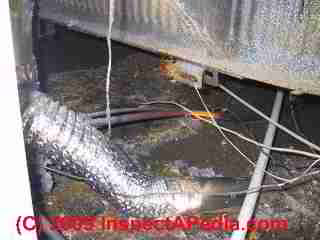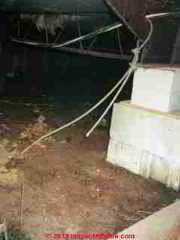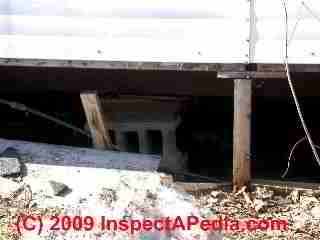 Mobile Home & DoubleWide Crawl Space Inspections
Mobile Home & DoubleWide Crawl Space Inspections
Defects commonly found in the crawl area of manufactured homes, mobile homes, trailers, doublewides
- POST a QUESTION or COMMENT about inspection procedures, defects, hazards found in crawl areas under manufactured homes, mobile homes, doublewides.
Mobile home crawl spaces.
This article describes the common defects that can be observed in the crawl space below a trailer, mobile home or doublewide home.
We include descriptions of the manufactured home or mobile home crawl space inspection components, both things that should be present (e.g. belly wrap, proper clearances) and also things that should not be present (rodents, leaks, wheels).
InspectAPedia tolerates no conflicts of interest. We have no relationship with advertisers, products, or services discussed at this website.
- Daniel Friedman, Publisher/Editor/Author - See WHO ARE WE?
Manufactured & Mobile Home Crawl Space Code Specifications
 Before crawling under a mobile home or manufactured home
Before crawling under a mobile home or manufactured home
Watch out: when working under a mobile home, manufactured home, or any tight crawl space there may be serious health and safety hazards. More than one reader have reported getting an electrical shock while working under a mobile or manufactured home. Hazards in such tight spaces include at least the following:
- Unsafe electrical wiring, if touched, can cause shock or even death by electrocution.
- Spills of sewage are unsanitary and risk serious illness
- Breathing insulation, dust, debris, or mold risks respiratory or other illness
- Eye injury from falling debris
- Entrapment: never enter a tight, dangerous area while working alone.
- See more details at CRAWL SPACE SAFETY ADVICE
When inspecting a mobile home or doublewide crawl area, be sure to look for evidence of these common defects
[Click to enlarge any image]
- Axle, Tongue & Wheels
should have been removed from a mobile home or manufactured home if it is to meet current U.S. HUD/FHA Manufactured Home standards. - Belly wrap
(plastic or other) to seal out moisture and hold in insulation: check for tears, leaks from above, rodent infestation, mold, or other damage.
See MOBILE HOME INSULATION BELLY WRAP for details - Clearances:
the mobile home must have a minimum of 18" of clearance space between the ground surface and the bottom of the beam or girder supporting the home and that rests on the pier tops or foundation.
Other standards include:
12" minimum beneath lowest frame member and ground in area of utility connections;
No more than 25% of the main frame can be less than 12" above grade;
If over basement or habitable lower level or more than 1/4 of home is more than 3' above grade a professional must design the foundation; - Ductwork
for HVAC system damaged, contaminated, not functional.
See MOBILE HOME HEATING SYSTEMS - Flooding, mold contaminated insulation.
Check the crawl space for signs of water entry right in the crawl itself; the skirt around the mobile home can keep the area from drying out.
Remember to look with care at the floor structure overhead, as you may find evidence there of leaks from above originating at the roof, walls, windows, doors, or plumbing system.
- Foundation requirements:
properly-constructed piers and proper footings below piers. A stack of hollow core blocks on their side sitting on wood scraps is not a safe nor adequate manufactured home foundation.
See MOBILE HOME FOUNDATIONS
and see MOBILE HOME PIERS - Freeze damaged plumbing
More information about mobile home plumbing can, of course be inspected inside
see - MOBILE HOME PLUMBING - Insulation
under the manufactured home, mobile home, doublewide or trailer has often damaged or pulled out for repair; rodents, water, leaks; air leaks; From the crawl space you can see only the belly wrap.
Details are at MOBILE HOME INSULATION & VENTILATION and also
at MOBILE HOME INSULATION BELLY WRAP - Insect damage
& rot: look for termites & carpenter ants - up skirt into floors/walls esp. @ leaks (plumbing, windows, doors) - Moisture barrier:
dirt floor crawl space surfaces under a manufactured home or mobile home must be covered with a 6-mil polyehtylene (or equivalent) moisture barrier - Multiwide connections
& connectors are required:
Ssee MOBILE HOME CONNECTIONS, MULTI-WIDE - Openings,
damaged insulation, leaking pipes, improper plumbing and wiring - Site grading
should not direct surface runoff nor roof spillage under the home but rather must direct it away). The skirting must be "self supporting" and rest on a concrete footing (to meet HUD/FHA Manufactured home specifications. - Skirting around the manufactured/mobile home base:
must be complete, intact, and include an access opening. The mobile home foundation perimeter wall ("skirt") has to enclose the foundation to resist vermin or other animal pests and to resist wind-driven rain.
Skirting around the crawl space of a manufactured home or mobile home can be made of various materials, masonry block, brick, treated wood, resting on a concrete footing. (Older aluminum or vinyl siding skirting won't quality co reinforced floating slab may work ok;
Permieter walls have to be at least 8" above surrounding grade.
See details at MOBILE HOME SKIRTING - Stabilizing systems:
look for the required tie downs, straps, cables, that may be required to protect the home from storm and wind damage in your area.
See MOBILE HOME STABILIZING SYSTEMS - Structural damage:
for doublewides inspect the center mating girder for signs of separation that may indicate framing damage, rot, poor original construction, or settlement of the supporting piers of the home's perimeter.
See MOBILE HOME STRUCTURAL DEFECTS - Utility Connections:
often visible below the manufactured or mobile home: must be permanently-installed. An "extension cord" hookup for electrical power, a garden hose for water supply, etc. are not acceptable. - Ventilation of the crawl area:
current U.S. HUD/FHA standards require one square foot of ventilation opening (screened foundation vents or skirting vents) per 150 square feet of the home's crawl space floor.
Mobile & Manufactured Home Crawl Space Research
- Beal, David, and David Chasar. MEASURED CRAWLSPACE CONDITIONS UNDER MANUFACTURED HOMES [PDF] Proceedings of the Fifteenth Symposium on Improving Building Systems in Hot and Humid Climates, Orlando, FL, July 24-26, 2006(2006).
This paper appears to cover the same ground as the FSEC paper cited below.
Excerpt from Conclusions
Some site builders and building scientists have been advocating totally un-vented crawlspaces that are sealed from any outside influence (Davis et al 2004).
Such crawlspaces can work but they do require higher standards of construction resulting in totally sealed crawlspaces and with some conditioned supply air or a dehumidifier. There are added concerns; how to deal with termite inspection, and what to do when a flood occurs (plumbing or rain related).
Solutions to these problems add to the complexity and cost of a true sealed crawlspace for the HUD-code industry. - FSEC MEASURED CRAWLSPACE CONDITIONS IN A HUD-CODE HOME [PDF]lorida Solar Energy Center and David Beal. (2006).
Abstract:
The Florida Solar Energy Center conducted research utilizing two unconditioned, old, singlewide side-by-side manufactured homes, one with a ground cover and one with exposed dirt under it. Three different skirting options were tested, open or no skirting, perforated skirting, and solid skirting.
Ambient and crawlspace dewpoints were recorded. The data is summarized in the table below.
The skirting configurations tested are in Column 1, Column 2 lists the average ambient dewpoint, 3 the ground cover crawlspace, 4 the exposed dirt crawlspace dewpoint.Successfully sealing HUD code home crawlspaces is the last piece of the puzzle of floor failures plaguing homes in hot, humid climates. Merely curing the duct leakage is not always enough to keep the floors of the house intact.
- US DOE CRAWL SPACE MOISTURE CONTROL [PDF] U.S. Department of Energy
- US DOE MOISTURE CONTROL IN BUILDINGS [PDF] U.S. Department of Energy
- US DOE MOISTURE CONTROL in WALLS [PDF] U.S. Department of Energy
...
Reader Comments, Questions & Answers About The Article Above
Below you will find questions and answers previously posted on this page at its page bottom reader comment box.
Reader Q&A - also see RECOMMENDED ARTICLES & FAQs
On 2021-01-27 by danjoefriedman (mod) - crawlspace encapsulation plans and the department of energy's requirements
Thanks for the helpful comments, Stacy. We'll keep them with the article.
My OPINION is that if we're going to the cost and trouble to encapsulate a mobile home crawl space, before starting the job it makes sense to inspect the condition of the belly wrap and insuation to be sure we're not leaving leaks or an extensive mold contamination or rodent problem in place - thus avoiding having to do the job twice.
When we confirm that the underside of the home is clean and insulatin & bellywrap both intact and not covering up a problem above, then it's time to get on with the encapsulation.
On 2021-01-26 by Stacy
I've looked at numerous crawlspace encapsulation plans and the department of energy's requirements.
There is no general need to remove intact floor insulation when you insulate the crawlspace.
Putting up foam boards on the crawlspace walls appears to be standard encapsulation practice, but it has a few potential issues. It is flammable, although less so if it has a foil backing.
Check the local tresidential code on fire safety requirements. If you're in a termite prone region, you may need to leave a few inches for an inspection gap. Termites can tunnel through foam, but don't want to eat it.
The purpose of encapsulation is to have the home better insulated from below. The vents let in cold air in the winter and humid air in the summer, so it's now considered better to permanently plug the vents, insulate the walls, allow for drainage, and run a dehumidifier or connect it to the HVAC system. This should help prevent pests, mold, mildew, and water damage.
On 2020-08-06 by Anonymous
I'm so sorry, Em, i just dont understand the question. Perhaps you can give sone details or attach a sketch or photo.
On 2020-08-06 by Em
This is my second question and I made three thru text. I can see the hey looked at it no response. I want to know about extending vinyl siding all the way down to the given distance. Can it be done and the side I plan on making a big access door. Appreciate an answer please it has been 3 weeks
On 2019-11-09 - by (mod) -
I am GUESSING from your note that what you're up to is foam insulating the floor of a mobile home. You won't be able to do that usefully without removing the present belly wrap and insulation and then adding something rigid enough to let you blow foam under the floors;
If you are only trying to seal the rim joist I'm stuck: why are we doing that? Is the floor insulation so incomplete that it never reaches the rim joist?
In sum, apologies but I'm not sure what encapsulating is for.
On 2019-11-08 by Mike
Do you need to completely remove floor insulation when encapsulating crawl space. I have a modular home and the floor insulation is held in place by a 'fabric'. Would I have to remove the 'fabric and insulation to insulate rim joists with closed cell foam or foam panels?
On 2018-11-13 - by (mod) -
That's very interesting question but frankly I'm highly doubtful. In order to operate a drone in a small confined space you need to have pretty good access yourself to control it and keep it from crashing into something. It's certainly worth asking a local drone operator but I also doubt that the cost is going to be worth it.
When an inspector cannot enter an area I think the least they can do is to tell you what they can see at the crawl space opening and perhaps what secondary
Clues are available to tell you what hints there are of hidden trouble. That would include water running under the unit or mechanical systems not working properly or mold smells or sewage smells. It seems to me also that there needs to be accessed in order to do repairs. So it would be good to get a clear statement on just what the limitations to access actually are.
On 2018-11-13 by Teresa
We have been told that an inspector can not get under our dad's mobile home to inspect. Can a drone be used. His house is on the market.
On 2018-08-28 - by (mod) -
Re-posting Q&A from private email
Cover for my mobile home. The one I have has fallen apart. I just purchased This home and I am told this cover is Important. Any suggestions would be Appreciated.
Reply: Moderator said:
Skirting around a mobile home is required by local building codes and is something you want anyway for a variety of reasons such avoiding wind blowing under the unit, keeping critters out, reducing heating or cooling costs.
Amazon.com sells skirting parts as do independent vendors like this Mobile Home Parts Store https://mobilehomepartsstore.com/skirting.html
Please take a look at MOBILE HOME CRAWL SPACES - above on this page - for information about the crawl area that should help you know what issues could be there.
You'll see that besides wanting the skirting around the home, there could be other problems that need to be addressed for function or safety of the home.
Don't hesitate to ask if this article leaves you with questions.
...
Continue reading at MOBILE HOME WALL DEFECTS or select a topic from the closely-related articles below, or see the complete ARTICLE INDEX.
Or see these
Recommended Articles
- CRAWL SPACE DRYOUT - home
- CRAWL SPACE SAFETY ADVICE
- CRAWL SPACE VENTILATION CODES
- MOBILE HOMES, DOUBLEWIDES, TRAILERS - home
- MOBILE HOME CODES, STANDARDS & MANUALS
- MOBILE HOME CRAWL SPACES
- MOBILE HOME FOUNDATIONS
- MOBILE HOME INSULATION BELLY WRAP
- MOBILE HOME LEAKS & MOISTURE
- MOBILE HOME PIERS
- MOBILE HOME SKIRTING
- MOBILE HOME SKIRTING CODES
- MOBILE HOME STABILIZING SYSTEMS
- MOBILE HOME STRUCTURAL DEFECTS
Suggested citation for this web page
MOBILE HOME CRAWL SPACES at InspectApedia.com - online encyclopedia of building & environmental inspection, testing, diagnosis, repair, & problem prevention advice.
Or see this
INDEX to RELATED ARTICLES: ARTICLE INDEX to MANUFACTURED & MOBILE HOMES
Or use the SEARCH BOX found below to Ask a Question or Search InspectApedia
Ask a Question or Search InspectApedia
Try the search box just below, or if you prefer, post a question or comment in the Comments box below and we will respond promptly.
Search the InspectApedia website
Note: appearance of your Comment below may be delayed: if your comment contains an image, photograph, web link, or text that looks to the software as if it might be a web link, your posting will appear after it has been approved by a moderator. Apologies for the delay.
Only one image can be added per comment but you can post as many comments, and therefore images, as you like.
You will not receive a notification when a response to your question has been posted.
Please bookmark this page to make it easy for you to check back for our response.
IF above you see "Comment Form is loading comments..." then COMMENT BOX - countable.ca / bawkbox.com IS NOT WORKING.
In any case you are welcome to send an email directly to us at InspectApedia.com at editor@inspectApedia.com
We'll reply to you directly. Please help us help you by noting, in your email, the URL of the InspectApedia page where you wanted to comment.
Citations & References
In addition to any citations in the article above, a full list is available on request.
- In addition to citations & references found in this article, see the research citations given at the end of the related articles found at our suggested
CONTINUE READING or RECOMMENDED ARTICLES.
- Carson, Dunlop & Associates Ltd., 120 Carlton Street Suite 407, Toronto ON M5A 4K2. Tel: (416) 964-9415 1-800-268-7070 Email: info@carsondunlop.com. Alan Carson is a past president of ASHI, the American Society of Home Inspectors.
Thanks to Alan Carson and Bob Dunlop, for permission for InspectAPedia to use text excerpts from The HOME REFERENCE BOOK - the Encyclopedia of Homes and to use illustrations from The ILLUSTRATED HOME .
Carson Dunlop Associates provides extensive home inspection education and report writing material. In gratitude we provide links to tsome Carson Dunlop Associates products and services.


